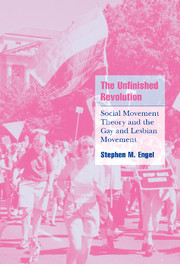Book contents
- Frontmatter
- Contents
- Notes on language
- Preface
- Introduction
- 1 Asked and answered: how questions can condition conclusions in social movement theory
- 2 Tracing the rainbow: an historical sketch of the American gay and lesbian movement
- 3 Tracing the rainbow: an historical sketch of the British gay and lesbian movement
- 4 Where and how it comes to pass: interest group interaction with political institutions
- 5 Asking the unasked question: grappling with the culture variable
- Conclusion
- Appendix: a survey of social movement theories
- Notes
- Bibliography
- Index
Conclusion
Published online by Cambridge University Press: 31 October 2009
- Frontmatter
- Contents
- Notes on language
- Preface
- Introduction
- 1 Asked and answered: how questions can condition conclusions in social movement theory
- 2 Tracing the rainbow: an historical sketch of the American gay and lesbian movement
- 3 Tracing the rainbow: an historical sketch of the British gay and lesbian movement
- 4 Where and how it comes to pass: interest group interaction with political institutions
- 5 Asking the unasked question: grappling with the culture variable
- Conclusion
- Appendix: a survey of social movement theories
- Notes
- Bibliography
- Index
Summary
A movement succeeds not when everything is perfect but when so much has changed that there's no going back. This is inarguably where we're at. Skirmishes will be won and lost, greater changes are to be anticipated, and the fight still needs everyone's best, but think of those women and men at the first Mattachine demonstration in 1965 and then watch a tape of Clinton's HRC speech.
Something's changed … We're still living in a world of shit, a lot of the shit is homophobic, all the shit's interrelated, and the fight is far from finished. But if we don't take an opportunity like a movie or a speech to mark that progress has been made, how are we going to remember, when we have cause to despair, that political action changes the world?
Tony Kushner, “Gay Perestroika”In 1969 some drag queens started a riot in Greenwich village sparking the gay liberation movement, and in 1997 the President of the United States of America delivered a speech to the Human Rights Campaign in Washington DC. In 1967, after Parliamentary debate ended on the Sexual Offences Act, the Act's primary architect, Lord Arran, contemptuously stated that “homosexuals must continue to remember that while there may be nothing bad in being homosexual, there is certainly nothing good.” Thirty years later, Labour Prime Minister Tony Blair proclaimed “I am eager to see a Labour government make significant progress towards ending discrimination and fostering a society free of homophobic prejudice.” In the mid-1980s few American mainstream films addressing gay themes or having gay characters were released.
- Type
- Chapter
- Information
- The Unfinished RevolutionSocial Movement Theory and the Gay and Lesbian Movement, pp. 158 - 166Publisher: Cambridge University PressPrint publication year: 2001

